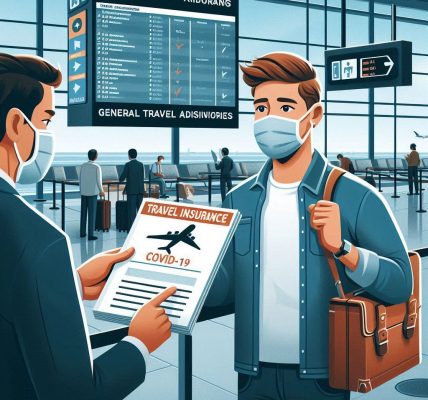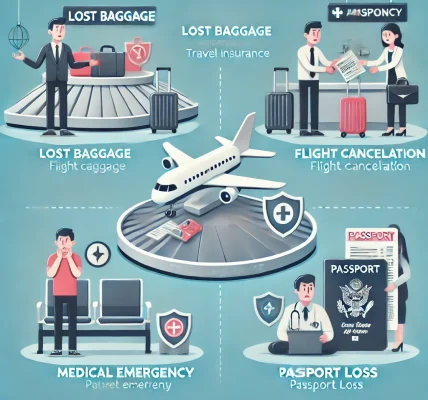The COVID-19 pandemic has had a profound impact on virtually every aspect of life, and travel is no exception. As countries locked down, flights were canceled, and travel plans were put on hold, the need for travel insurance became more apparent than ever. But while travel insurance has always been essential, the pandemic has drastically altered the way policies are structured, with new coverage options, exclusions, and terms designed to address the unique challenges of traveling during a global health crisis.
In this blog, we’ll explore how COVID-19 has changed travel insurance policies, what adjustments travelers should be aware of, and how to choose the right policy in this new landscape.
1. The Emergence of COVID-19 Coverage
Before the pandemic, most travel insurance policies did not cover issues related to pandemics or epidemics. In fact, most standard policies would exclude coverage for cancellation or medical expenses related to a contagious disease. However, as COVID-19 spread globally, insurers had to adapt to meet the changing needs of travelers.
Now, many travel insurance providers offer specific coverage for COVID-19-related incidents. This includes:
- COVID-19 Medical Coverage:
- If you contract COVID-19 while traveling, medical insurance can cover treatment costs, including hospitalization, doctor visits, and medication.
- Quarantine Coverage:
- In case you are required to quarantine at your destination or upon returning home, some policies cover the cost of additional accommodation and food.
- Trip Cancellation Due to COVID-19:
- If you need to cancel your trip due to a positive COVID-19 test, most travel insurance policies now offer trip cancellation coverage, ensuring that you can recover your non-refundable expenses.
- Trip Interruption:
- If you’re forced to cut your trip short due to COVID-19 (e.g., you need to return home early because of an outbreak), insurers offer trip interruption coverage to reimburse you for unused travel expenses.
- Travel Delay:
- In the event of flight delays caused by COVID-19-related issues (such as border closures or lockdowns), many insurers now cover the cost of meals, accommodations, and other expenses incurred.
2. The Rise of “Cancel for Any Reason” Coverage
One of the biggest changes to travel insurance policies since COVID-19 is the increased popularity of Cancel for Any Reason (CFAR) coverage. This optional add-on allows travelers to cancel their trip for almost any reason, including concerns about COVID-19, and receive reimbursement for non-refundable expenses.
- Before the Pandemic: CFAR coverage was available but not commonly purchased, as travelers typically didn’t need flexibility in trip cancellation.
- During the Pandemic: With lockdowns, sudden travel restrictions, and the possibility of contracting COVID-19, CFAR coverage became a must-have for many travelers. This coverage allows you to cancel your trip without providing a specific reason (e.g., fear of catching COVID-19 or potential travel restrictions) and still get reimbursed for your non-refundable costs.
While CFAR coverage is more expensive than traditional trip cancellation coverage, it offers the peace of mind that you can cancel your plans for reasons beyond your control.
3. Increased Attention to Medical Coverage
As COVID-19 brought travel disruptions and health risks to the forefront, many travelers are now prioritizing medical coverage when purchasing travel insurance. Travel insurance policies that include comprehensive medical coverage can cover a wide range of health-related issues, including emergency medical expenses, evacuation, and more.
Some key considerations for senior travelers and those with pre-existing conditions include:
- COVID-19 Treatment Abroad: If you fall ill with COVID-19 while abroad, you may need treatment that could be expensive without the right coverage. Insurers are now offering policies that specifically include COVID-19 medical coverage to ensure travelers receive the treatment they need while overseas.
- Medical Evacuation: If you’re in a destination where COVID-19 treatment is unavailable or subpar, medical evacuation coverage can help transport you to a location with better facilities.
- Pre-Existing Conditions and COVID-19: For travelers with pre-existing conditions, getting coverage for COVID-19-related issues can be challenging. Many insurers now offer policies that cover pre-existing conditions and related complications caused by COVID-19, but it’s crucial to check the fine print before purchasing.
4. Coverage for Travel Restrictions and Border Closures
One of the most significant travel disruptions during the pandemic was the unpredictability of travel restrictions and border closures. Governments frequently imposed new rules, including sudden quarantines, lockdowns, and travel bans, that disrupted travelers’ plans.
Travel insurance policies have adapted by offering specific coverage for situations where:
- Border Closures Prevent You from Traveling:
- If you’re unable to travel because your destination country closes its borders, some travel insurance plans provide trip cancellation or trip interruption coverage.
- Unexpected Travel Bans or Restrictions:
- If you’re already on your trip and a new travel ban is enacted, causing your return flight to be canceled or delayed, your policy might cover the additional costs associated with the delay, including accommodation and meals.
This type of coverage is essential for international travelers, as the rules and regulations are still evolving in many countries around the world.
5. The Need for Flexible Travel Insurance Policies
Flexibility has become a key consideration when choosing travel insurance in the post-COVID world. Travelers want policies that can adapt to changing circumstances, from unexpected illness to last-minute cancellations or travel restrictions.
To meet this need, many insurers have made their policies more flexible, allowing for:
- Policy Modifications: Some insurers allow you to change your coverage if the circumstances of your trip change. For example, you can upgrade your policy to include additional COVID-19 coverage or extend coverage if your trip is prolonged.
- Refundable Premiums: Some companies now offer refundable premiums if you have to cancel your trip before departure, which can be beneficial if the situation changes unexpectedly.
6. Travel Insurance for the New Normal
As we continue to navigate the post-COVID world, it’s clear that travel insurance policies will remain vital for ensuring safe, worry-free travel. However, it’s also evident that insurance providers will continue to evolve their offerings to keep pace with ongoing risks and challenges.
What can travelers expect in the future?
- More pandemic-related coverage as travel continues to carry some level of risk due to potential new outbreaks.
- Continuous policy adaptability, allowing for changes to cover evolving travel conditions, including quarantine requirements, vaccination mandates, or rapid testing.
- Increased digital solutions, such as easy access to claim filing and real-time updates on policy changes related to COVID-19.
Final Thoughts
The COVID-19 pandemic has reshaped the way travel insurance is offered, with new coverage options, broader flexibility, and more comprehensive protections for travelers. Whether you’re booking a vacation or business trip, it’s essential to stay up-to-date with the latest travel insurance options that include COVID-19 coverage, trip cancellations, medical expenses, and more.
As the world begins to open up again, traveling is more possible than ever, but it’s also more important than ever to protect yourself with the right travel insurance. Stay safe, stay informed, and travel with peace of mind knowing that you have the right coverage to handle whatever comes your way.



